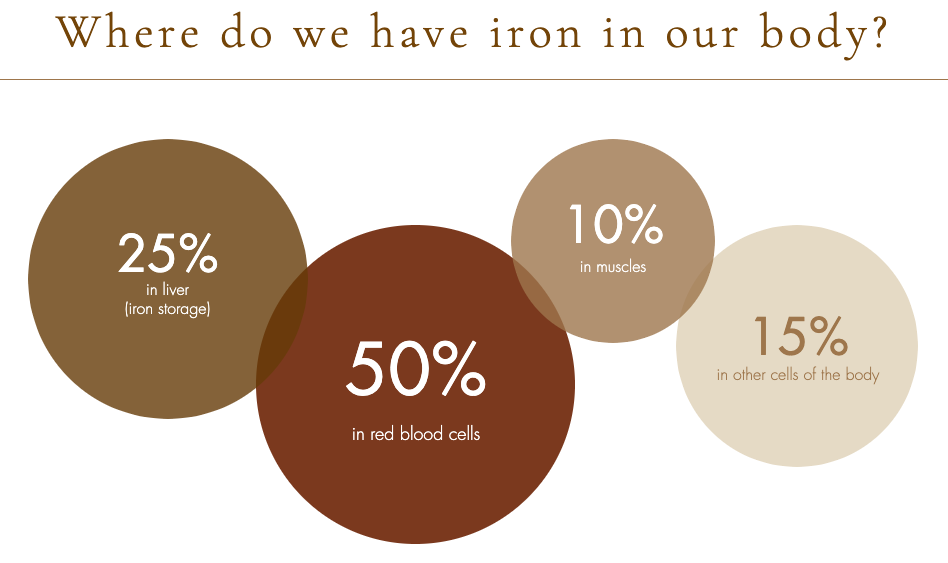SHARES

Iron deficiency is the most common nutritional deficiency globally. It affects ~1 in 3 women, consistently shown in global and local data. Unfortunately, anaemic patients detect it only when they become anaemic. Symptoms include fatigue, hair loss, brain fog, poor immune function (i.e. more prone to common cold/flu), cold intolerance and more.
Iron Deficiency is a type of Anaemia
People often confuse between iron deficiency and anaemia or consider them the same condition. Haemoglobin (HB) routine blood test can easily detect anaemia. However although iron deficiency is the most common cause of anaemia but it is not the only cause. Therefore the actual underlying cause of anaemia is not certain with the HB test.
Ask your doctor to check your serum ferritin to detect iron deficiency at your next check-up. Serum ferritin is an important test to distinguish between iron deficiency anaemia and anaemia of chronic disease (also called anaemia of inflammatory response). Importantly, iron deficiency generally occurs years before anaemia so early treatment can avoid anaemia completely Besides knowing your iron levels early may avoid the need for later therapeutic interventions.
Serum ferritin is a marker of the iron stores in the body. When the blood concentration falls below 30ng/mL (nanograms pr millilitre) the body no longer has enough iron and is probably experiencing many of the symptoms of iron deficiency. In fact, only at levels above 100ng/mL can a patient be sure that enough iron is in the body.
Women are most at risk of iron deficiency due to monthly menses
For every 1mL of blood that women lose, we lose 0.5mg iron. Over a year, a woman with heavy menses can have annual losses exceeding 500mg iron. If you consider that most women only have about 3,000mg or iron in their body it is easy to understand why so many are at risk of iron deficiency.
To make things worse, during pregnancy the growing baby will require about 1,000mg of iron from the mother. As 40% of women enter pregnancy in an iron deficient state too many will deliver in a highly iron-deficient state (and many also anaemic due to their iron deficiency). Consequences exist for mother and baby (risk of post-partum depression, low birth weight etc.).
Humans cannot make iron so we are 100% reliant on our diet
Iron is best absorbed from haem sources. This is not only red meat but also fish, seafood and chicken. Whilst many vegetables have high iron content our bodies cannot absorb this phyto-form of iron nearly as well.
Available treatments
Many forms of oral iron tablets are available, but they can cause gastrointestinal issues including diarrhoea, constipation or nausea. It is probably not worth taking iron within a multi-vitamin pack as the iron content is very low and amount you can absorb is not sufficient. You will probably need to take iron tablets for 6-12 months to replete your stores if you are deficient. And it is important to recheck your iron levels once you start oral iron as not everyone responds to it. If it’s not working for you it probably doesn’t make sense to continue taking aimlessly.
Intravenous iron (or iron administered via the veins) is a viable option for many. Clinical data continues to grow and demonstrates that IV iron offers a rapid correction of iron deficiency with just 1 or 2 injections plus symptomatic relief in a matter of days. Patients often observe improvements in exercise performance, as well as overall general well-being. It has also been demonstrated to be highly effective in the 2nd and 3rd trimester of pregnancy (when most women will become iron deficient – even when taking iron tablets). If oral iron isn’t working for you or if you require a rapid correction then IV iron might be an alternative to discuss with your doctor.
No Iron? Check your ferritin and know your iron!
Acknowledgment: This article and the images are contributed by The Iron Suites Medical Centre, 160 Robinson Road #04-11, SBF Center, Singapore 068914, +65 6702 1929
Tags
by Yashwini Ravindranath
Born & raised in Malaysia, Yashwini earned her M.D. studying in Moscow's Russian National Research Medical University. With an affiliation towards research, all things coffee and the startup ecosystem, she now contributes articles to GetDocSays View all articles by Yashwini Ravindranath.





